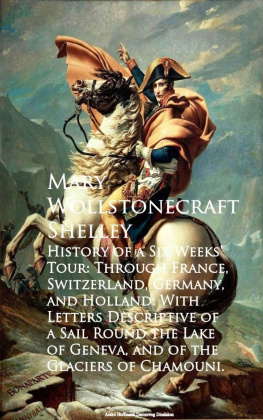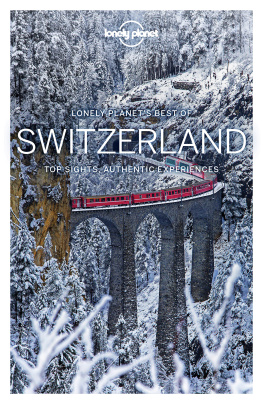Table of Contents
HISTORY
OF
A SIX WEEKS' TOUR
THROUGH
A PART OF FRANCE, SWITZERLAND, GERMANY, AND HOLLAND:
WITH LETTERS
DESCRIPTIVE OF
A SAIL ROUND THE LAKE OF GENEVA, AND OF THE GLACIERS OF CHAMOUNI.
PREFACE.
Nothing can be more unpresuming than this little volume. It contains the account of some desultory visits by a party of young people to scenes which are now so familiar to our countrymen, that few facts relating to them can be expected to have escaped the many more experienced and exact observers, who have sent their journals to the press. In fact, they have done little else than arrange the few materials which an imperfect journal, and two or three letters to their friends in England afforded. They regret, since their little History is to be offered to the public, that these materials were not more copious and complete. This is a just topic of censure to those who are less inclined to be amused than to condemn. Those whose youth has been past as theirs (with what success it imports not) in pursuing, like the swallow, the inconstant summer of delight and beauty which invests this visible world, will perhaps find some entertainment in following the author, with her husband and sister, on foot, through part of France and Switzerland, and in sailing with her down the castled Rhine, through scenes beautiful in themselves, but which, since she visited them, a great Poet has clothed with the freshness of a diviner nature. They will be interested to hear of one who has visited Mellerie, and Clarens, and Chillon, and Vevaiclassic ground, peopled with tender and glorious imaginations of the present and the past.
They have perhaps never talked with one who has beheld in the enthusiasm of youth the glaciers, and the lakes, and the forests, and the fountains of the mighty Alps. Such will perhaps forgive the imperfections of their narrative for the sympathy which the adventures and feelings which it recounts, and a curiosity respecting scenes already rendered interesting and illustrious, may excite.
The Poem, entitled Mont Blanc, is written by the author of the two letters from Chamouni and Vevai. It was composed under the immediate impression of the deep and powerful feelings excited by the objects which it attempts to describe; and as an undisciplined overflowing of the soul, rests its claim to approbation on an attempt to imitate the untameable wildness and inaccessible solemnity from which those feelings sprang.
HISTORY
OF
A SIX WEEKS' TOUR.
It is now nearly three years since this Journey took place, and the journal I then kept was not very copious; but I have so often talked over the incidents that befell us, and attempted to describe the scenery through which we passed, that I think few occurrences of any interest will be omitted.
We left London July 28th, 1814, on a hotter day than has been known in this climate for many years. I am not a good traveller, and this heat agreed very ill with me, till, on arriving at Dover, I was refreshed by a sea-bath. As we very much wished to cross the channel with all possible speed, we would not wait for the packet of the following day (it being then about four in the afternoon) but hiring a small boat, resolved to make the passage the same evening, the seamen promising us a voyage of two hours.
The evening was most beautiful; there was but little wind, and the sails flapped in the flagging breeze: the moon rose, and night came on, and with the night a slow, heavy swell, and a fresh breeze, which soon produced a sea so violent as to toss the boat very much. I was dreadfully seasick, and as is usually my custom when thus affected, I slept during the greater part of the night, awaking only from time to time to ask where we were, and to receive the dismal answer each timeNot quite half way.
The wind was violent and contrary; if we could not reach Calais, the sailors proposed making for Boulogne. They promised only two hours' sail from shore, yet hour after hour passed, and we were still far distant, when the moon sunk in the red and stormy horizon, and the fast-flashing lightning became pale in the breaking day.
We were proceeding slowly against the wind, when suddenly a thunder squall struck the sail, and the waves rushed into the boat: even the sailors acknowledged that our situation was perilous; but they succeeded in reefing the sail;the wind was now changed, and we drove before the gale directly to Calais. As we entered the harbour I awoke from a comfortless sleep, and saw the sun rise broad, red, and cloudless over the pier.
FRANCE.
Exhausted with sickness and fatigue, I walked over the sands with my companions to the hotel. I heard for the first time the confused buzz of voices speaking a different language from that to which I had been accustomed; and saw a costume very unlike that worn on the opposite side of the channel; the women with high caps and short jackets; the men with earrings; ladies walking about with high bonnets or coiffures lodged on the top of the head, the hair dragged up underneath, without any stray curls to decorate the temples or cheeks. There is, however, something very pleasing in the manners and appearance of the people of Calais, that prepossesses you in their favour. A national reflection might occur, that when Edward III. took Calais, he turned out the old inhabitants, and peopled it almost entirely with our own countrymen; but unfortunately the manners are not English.
We remained during that day and the greater part of the next at Calais: we had been obliged to leave our boxes the night before at the English customhouse, and it was arranged that they should go by the packet of the following day, which, detained by contrary wind, did not arrive until night. S*** and I walked among the fortifications on the outside of the town; they consisted of fields where the hay was making. The aspect of the country was rural and pleasant.
On the 30th of July, about three in the afternoon, we left Calais, in a cabriolet drawn by three horses. To persons who had never before seen any thing but a spruce English chaise and post-boy, there was something irresistibly ludicrous in our equipage. A cabriolet is shaped somewhat like a post-chaise, except that it has only two wheels, and consequently there are no doors at the sides; the front is let down to admit the passengers. The three horses were placed abreast, the tallest in the middle, who was rendered more formidable by the addition of an unintelligible article of harness, resembling a pair of wooden wings fastened to his shoulders; the harnesses were of rope; and the postillion, a queer, upright little fellow with a long pigtail, craqued his whip, and clattered on, while an old forlorn shepherd with a cocked hat gazed on us as we passed.
The roads are excellent, but the heat was intense, and I suffered greatly from it. We slept at Boulogne the first night, where there was an ugly but remarkably good-tempered femme de chambre. This made us for the first time remark the difference which exists between this class of persons in France and in England. In the latter country they are prudish, and if they become in the least degree familiar they are impudent. The lower orders in France have the easiness and politeness of the most well-bred English; they treat you unaffectedly as their equal, and consequently there is no scope for insolence.
We had ordered horses to be ready during the night, but we were too fatigued to make use of them. The man insisted on being paid for the whole post. Ah! Madame , said the femme-de-chambre, pensez-y; c'est pour de dommager les pauvres chevaux d'avoir perdues leur douce sommeil . A joke from an English chamber-maid would have been quite another thing.
The first appearance that struck our English eyes was the want of enclosures; but the fields were flourishing with a plentiful harvest. We observed no vines on this side Paris.









